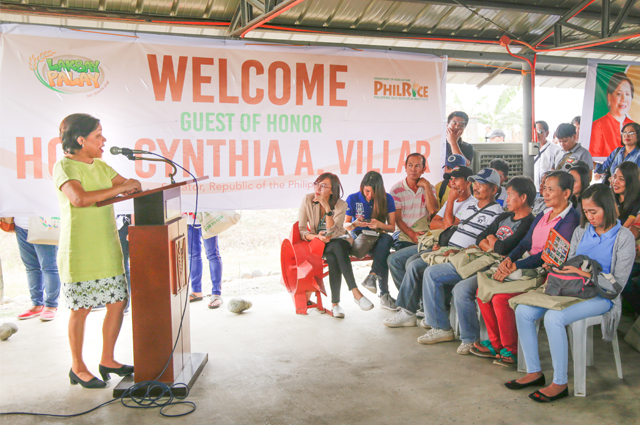The Philippines
April 11, 2018

Sen. Cynthia A. Villar, agriculture committee chair, urged rice farmers to use quality rice seeds and farm machineries to earn good income and become competitive in the local and international market.
“[Trade liberalization compels us to be more competitive as agricultural crops such as rice from other countries will easily be available in the market]. To compete [with other rice-producing countries such as Vietnam], you have to reduce production cost. That can only be possible if you learn how to use quality rice seeds and farm machineries,” Villar said during the 2018 Lakbay Palay Dry Season at PhilRice Central Experiment Station, April 3.
Under the General Agreement on Tariffs and Trade, the country is expected to ease up its control on the entry of imported products by reducing the quotas and its tariff on imported rice.
“I am [instructing] PhilRice to educate as many farmers as possible on the use of quality rice seeds. They are here to help you increase your yield and reduce farm expenses. Your survival under trade liberalization depends on yourself. We can only help you with government programs and services,” she said.
Villar encouraged the farmers to plant the right kind of variety that is appropriate for their local condition, and can produce good yield. Currently, the national average yield in rice production is at 4 mt/ha while Nueva Ecija, the country’s rice granary, produces rice at 5.8 mt/ha.
“If Nueva Ecija can, other provinces can also do it. PhilRice bred a number of varieties that exceeds the national average of production. Let’s explore the options because it can enhance our yield,” she said.
Among the machineries, she identified the use of mechanical transplanter, combine harvester, and mechanical dryer as main machines that can reduce labor cost.
Compared to Vietnam, which produces good yield at P6/kilo, labor comprises 37% of the total rice production cost in the Philippines, which is also much higher than exporting countries. Filipino farmers spend P12.41 to produce a kilo of rice.
Filipino farmers also spend 65 days per hectare throughout the rice production process. In highly mechanized countries including China, Vietnam, and China, farmers work for 10-35 days per hectare.
During crop establishment, mechanical transplanter can significantly reduce labor from 20 to only two laborers in 1 ha. It can also help enhance yield by 5% and prevent losses during harvesting and drying.
Combine harvester which upgraded both reaping and threshing in one passing, can reduce cost and postharvest losses from 5% to 3% per hectare.
The mechanical dryer can also reduce drying time and can allow drying during unfavorable weather conditions.
Villar also said that government interventions such as the shared facilities program, loan services, and the free irrigation program are easily available and accessible for the farmers.
According to Villar, the agriculture committee is improving and developing government initiatives for the rice industry. Some of these include looking for ways to reduce the interest of agricultural loans at 2% per annum; training of trainers on quality rice seed production on a national scale, and the establishment of farm schools all over the country.
“We are trying hard to give you education because it is the only thing that cannot be taken way from you. And when you learn and use these technologies, farmers no longer have to sing Magtanim ay ‘di biro (Planting rice is never fun). We hope you cooperate with us,” she exclaimed.